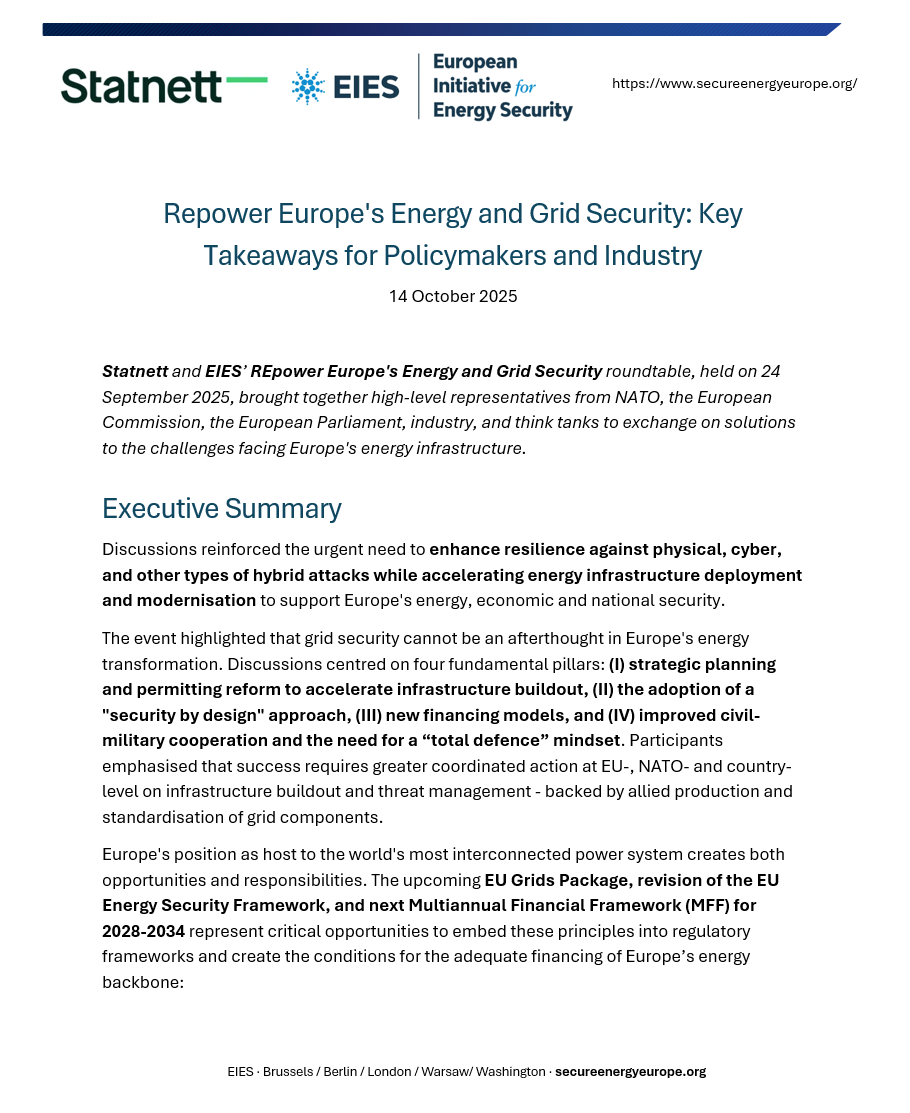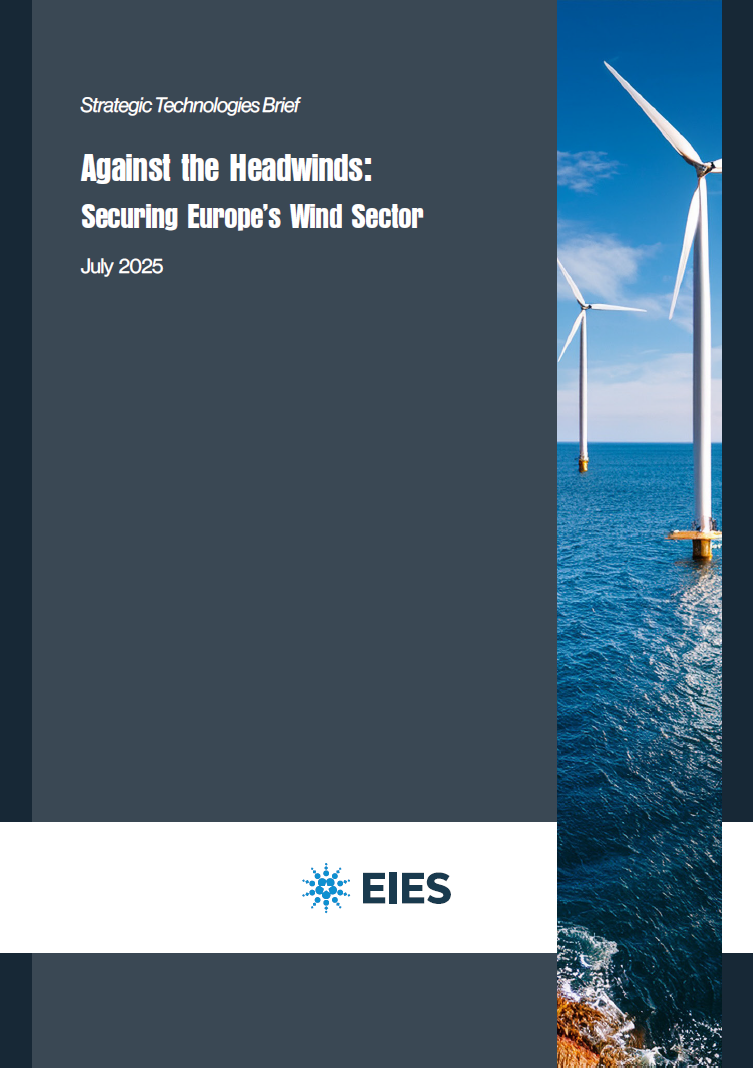Research
EIES undertakes in-depth research through a network of energy and security experts to inform policy and business decisions on European energy and supply chain security.
EIES recruits experts to support our research on a rolling basis. Use the link below to get in touch with our policy team.
Publications
-

October 2025
Statnett and EIES’ REpower Europe's Energy and Grid Security roundtable, held on 24 September 2025, brought together high-level representatives from NATO, the European Commission, the European Parliament, industry, and think tanks to exchange on solutions to the challenges facing Europe's energy infrastructure.
-

August 2025
The regulatory framework that was designed for gradual infrastructure evolution no longer serves Europe's urgent demand for rapid, coordinated grid deployment at an unprecedented scale. To secure its grid, Europe needs to reform its regulatory framework and mobilise investment.
-

July 2025
Intensifying competition from China, coupled with domestic regulatory barriers, component supply chain risks, and infrastructure bottlenecks, are challenging European wind manufacturers’ longstanding leadership. Against the Headwinds: Securing Europe’s Wind Sector outlines a pathway to enhance European leadership in wind power.
-

May 2025
As global competition for advanced technology manufacturing intensifies, risks of trade disruptions mount, and energy prices remain persistently high, the European Union must respond with a robust, clear, and actionable state aid framework that enables rapid and sustained investment in domestic energy and clean tech production.
-

April 2025
EIES and T&E organised a Chatham House rules workshop on 20 March 2025 with senior policymakers, industry representatives and clean tech manufacturing, and security experts to discuss how the EU can set an effective framework to manage risk and require technology and skills transfer from Chinese clean tech investment.
-

April 2025
Aetlan released a new report for EIES: Strategic Grid Technologies for European Resilience: Blueprints for acceleration. The report calls for the development at scale of strategic grid technologies in Europe including distributed energy resources (DERs), power asset software platforms, and drones (unmanned aerial vehicles, UAVs) for infrastructure resilience.
-

February 2025
Dunne Insights releases an independent report produced for EIES: Europe’s Auto & Battery Industry, Revolutionary Change – or Extinction. The brief proposes a European roadmap towards strategic autonomy in the global battery and electric vehicle (EV) industry, recommending €100 billion in targeted battery investments between 2025 and 2035.
-

January 2025
The European Union (EU) has promoted trade and investment liberalisation for decades. The world, however, has changed. Increased geopolitical risks driven by competing economic models and strategic goals, as well as strategic miscalculations mean that the EU needs to re-think its international engagement and focus on economic security.
-

December 2024
EIES convened NATO’s recently appointed ASG for Innovation, Hybrid and Cyber, Jean-Charles Ellermann-Kingombe, alongside DG ENER’s Ditte Juul Jørgensen, and industry experts for a roundtable discussion on policy and industry solutions to address growing cyber and physical threats to energy infrastructure and supply chains.
-

December 2024
Europe faces unprecedented security challenges, including the largest armed conflict on the continent since World War II and escalating hybrid threats such as weaponised trade. This brief advocates for the adoption of a risk-based approach to European security, encompassing national security and economic security.
-

July 2024
For over a century, Russian strategists have understood the critical role of energy, especially electricity, in national cohesion and resiliency. This publication examines Russian strategies to date, analyse recent Russian actions in Europe, and discuss ways Europe and the US can harden their energy infrastructure, build resilience, and devalue, dissuade and defeat the Russian threat.
-

June 2024
As Europe’s political and economic leadership considers how to compete in this environment and deliver the energy transition in a way that provides security and economic prosperity, it is important to reflect on China’s own industrial strategy and modus operandi in global supply chains to understand the scale of this geopolitical and economic challenge, and craft policies to address it.
-

Mar 2024
On 21 February 2024, alongside SAFE’s Center for Critical Minerals Strategy, EIES convened a group of subject matter experts and industry players along critical raw materials supply chains to assess and address risks posed by strategic dependencies on China.
-

Dec 2023
EIES’s launch paper examines Europe's strategic energy supply chain dependencies and vulnerabilities, identifying a path for derisking the energy transition while safeguarding industrial competitiveness.
-

May 2023
. . . Europe’s dependency on Russian gas made us vulnerable. So, we should not make the same mistakes with China and other authoritarian regimes. We must not become too dependent on products and raw materials we import. (NATO Secretary General Jens Stoltenberg, Munich Security Conference, February 2023)
-

Jan 2023
The energy challenges that the world faces today are increasingly global in nature. As we look for a path towards a safe, secure, and clean energy future, we must widen our perspective to find a path to address those global challenges together.

